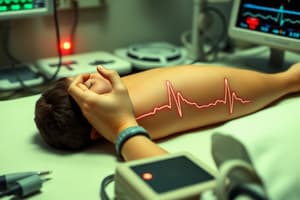Podcast
Questions and Answers
What defines tachycardia in terms of resting heart rate?
What defines tachycardia in terms of resting heart rate?
- 70 bpm
- 100 bpm (correct)
- 80 bpm
- 90 bpm
The T wave on an electrocardiogram indicates which phase of the heart's electrical activity?
The T wave on an electrocardiogram indicates which phase of the heart's electrical activity?
- Atrial repolarization
- Delay of electrical impulse at the AV node
- Ventricular repolarization (correct)
- Atrial depolarization
In a 12-lead electrocardiogram, where is the ground electrode commonly placed?
In a 12-lead electrocardiogram, where is the ground electrode commonly placed?
- Left arm
- Right leg (correct)
- Right arm
- Fourth intercostal space on the right side
Based on the health information provided, how many coronary risk factors does the individual have?
Based on the health information provided, how many coronary risk factors does the individual have?
What is the term for the heart, lungs, and circulatory system's ability to efficiently supply oxygen to muscles?
What is the term for the heart, lungs, and circulatory system's ability to efficiently supply oxygen to muscles?
To minimize a client's test anxiety, what is the best suggestion to follow?
To minimize a client's test anxiety, what is the best suggestion to follow?
What is the significance of a fasting blood glucose level of 140 mg/dL in the health assessment?
What is the significance of a fasting blood glucose level of 140 mg/dL in the health assessment?
What constitutes an unhealthy BMI for the individual mentioned, whose BMI is 32 kg/m2?
What constitutes an unhealthy BMI for the individual mentioned, whose BMI is 32 kg/m2?
Which option accurately describes ventricular depolarization in an ECG?
Which option accurately describes ventricular depolarization in an ECG?
What is not a component of cardiorespiratory endurance?
What is not a component of cardiorespiratory endurance?
What is essential for tests assessing physical fitness status?
What is essential for tests assessing physical fitness status?
Which term refers to the probability of correctly identifying individuals at risk of a specific disease?
Which term refers to the probability of correctly identifying individuals at risk of a specific disease?
What is it called when someone is identified as having risk factors despite having none?
What is it called when someone is identified as having risk factors despite having none?
How many participants are typically required for accurate population representation?
How many participants are typically required for accurate population representation?
What can a test have excellent reliability but poor?
What can a test have excellent reliability but poor?
Which type of prediction equation accounts for diverse physical characteristics of individuals?
Which type of prediction equation accounts for diverse physical characteristics of individuals?
What percentage of individuals starting an exercise program typically drop out within one year?
What percentage of individuals starting an exercise program typically drop out within one year?
In which stage of motivational readiness is a client who exercises but not sufficiently active?
In which stage of motivational readiness is a client who exercises but not sufficiently active?
What level of motivation exists when a person exercises autonomously for health benefits?
What level of motivation exists when a person exercises autonomously for health benefits?
How many daily steps must an adult typically take to be classified as active?
How many daily steps must an adult typically take to be classified as active?
Flashcards are hidden until you start studying
Study Notes
Tachycardia and Electrocardiogram
- Tachycardia is defined as a resting heart rate exceeding 100 bpm.
- The T wave in an electrocardiogram represents ventricular repolarization, indicating the heart's recovery phase after contraction.
- The ground electrode for a 12-lead electrocardiogram is placed on the right leg.
Coronary Risk Factors
- A 40-year-old male client demonstrates four coronary risk factors based on lifestyle and health metrics:
- BMI of 32 kg/m² categorizes him as obese.
- Total cholesterol level is at 190 mg/dL, which is borderline high.
- Fasting blood glucose level is at 140 mg/dL, indicating possible diabetes.
- Blood pressure reading of 130/84 mmHg is in the elevated range.
Cardiorespiratory Endurance
- Cardiorespiratory endurance refers to the efficiency of the heart, lungs, and circulatory system to supply oxygen to working muscles.
- To minimize client test anxiety, creating a private and comfortable testing environment is essential.
Assessing Physical Fitness
- Tests to assess physical fitness should be reliable, objective, and valid to ensure accurate fitness evaluations.
- Sensitivity in testing refers to the ability to identify individuals with risk factors accurately.
Testing Outcomes
- A false positive occurs when an individual is identified as having risk factors despite not having any.
- For reliable data representation, 100 to 400 participants are generally needed in studies.
Test Reliability and Validity
- A test can exhibit excellent reliability but poor validity, meaning it may consistently yield the same results but not measure what it's supposed to.
- Generalized prediction equations account for diverse samples by including physical characteristic predictors.
Exercise Progression
- Systematic overload of the cardiopulmonary system is necessary for continuous improvement, achieved by increasing frequency, duration, and intensity.
- Approximately 50% of individuals starting an exercise program will drop out within a year.
Motivational Readiness
- A client exercising but not meeting recommended activity levels is in the preparation stage of motivational readiness.
- Self-determined extrinsic motivation involves personal choice for health improvement, beyond external pressures.
Physical Activity Levels
- An adult considered active, according to pedometer classification, needs to take 10,000 to 12,499 daily steps.
- Positive factors for exercise adherence include self-efficacy and satisfaction with the exercise environment, while climate or season may negatively affect participation.
Training Principles
- The principle of initial values indicates that individuals with low fitness levels experience greater improvements in response to training compared to those with higher initial fitness levels.
Studying That Suits You
Use AI to generate personalized quizzes and flashcards to suit your learning preferences.




